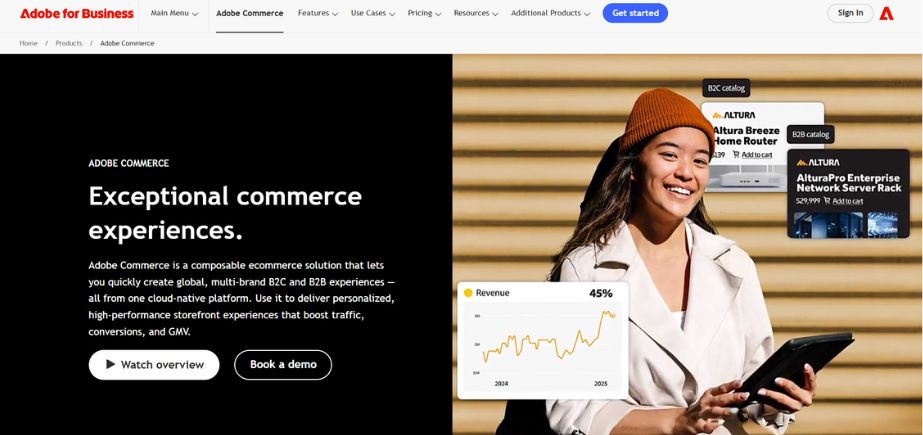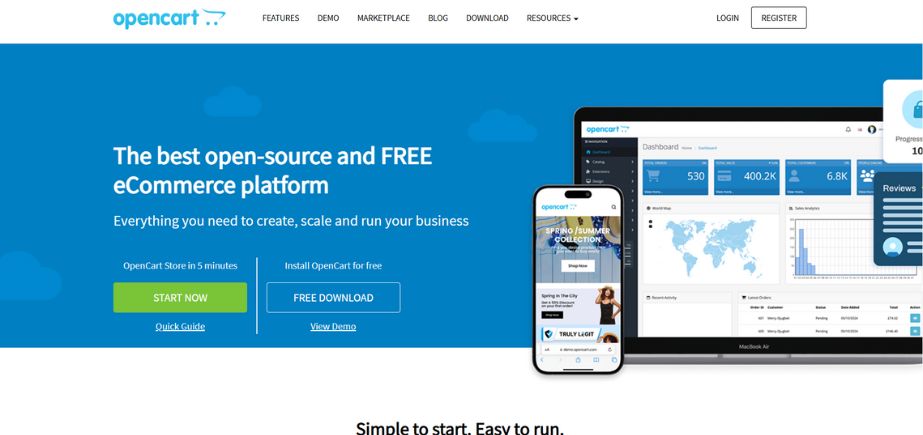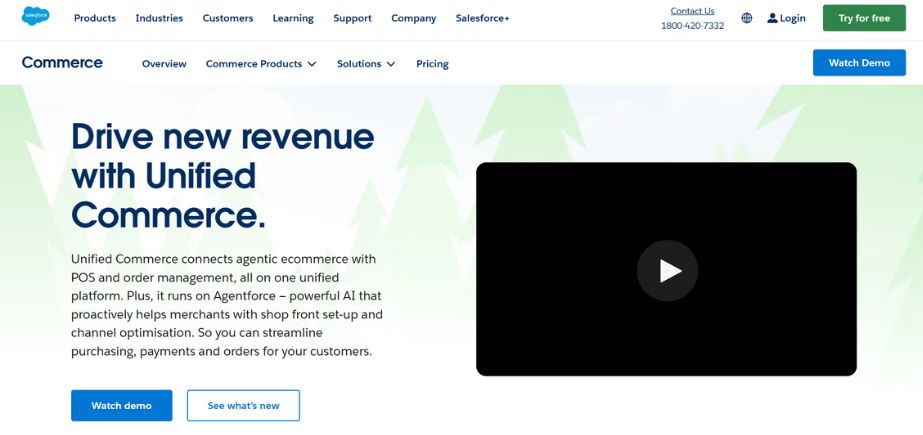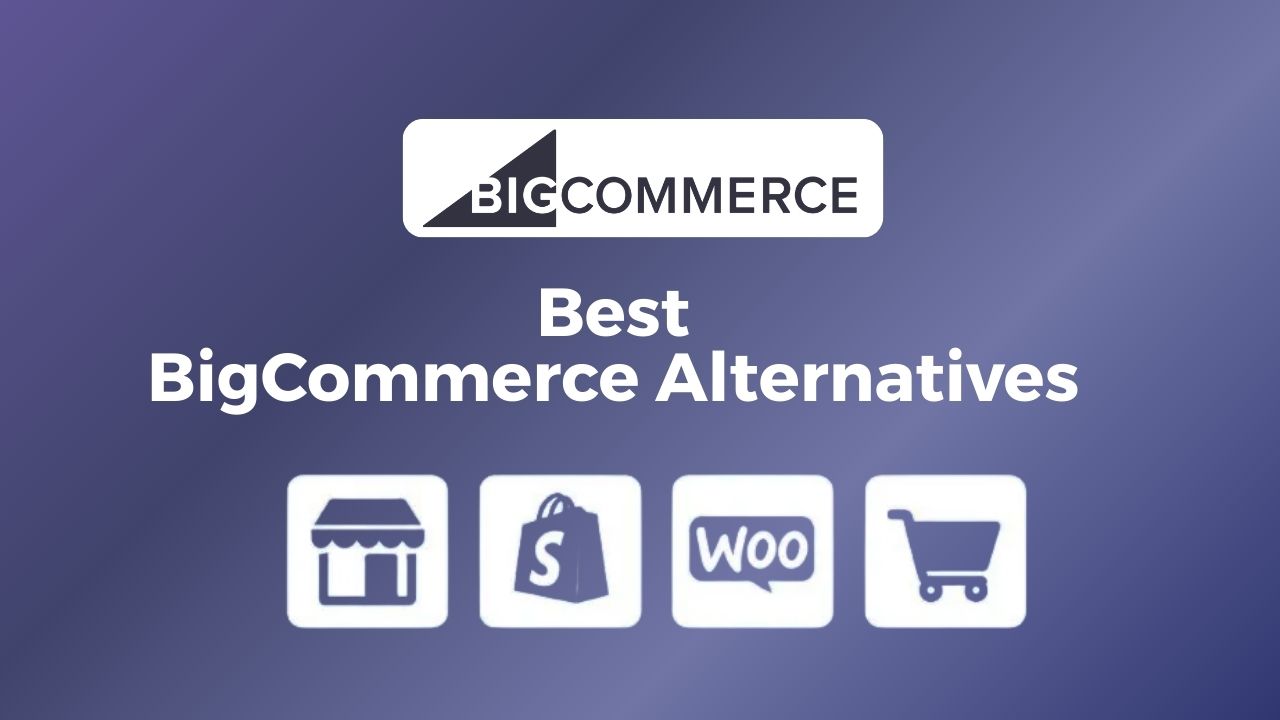BigCommerce has already set itself as a strong eCommerce platform, providing businesses with a full solution to the creation and operation of online stores. BigCommerce has become the choice of thousands of merchants all over the world using its built-in functionality, scalable infrastructure, and enterprise-level functionality. But, even with its merits, there are numerous businesses that end up seeking BigCommerce Alternatives that can become more compatible with their personal needs, budget limitations, or technical needs.
BigCommerce has many reasons why companies would consider an alternative. Pricing structure becomes a challenge to some merchants as their business expands, and to others, more flexibility in design or greater integration with the current system is desired. The small business may require cheaper solutions, and the enterprises may require more sophisticated customization features. Also, companies that already invested in particular ecosystems (such as WordPress) are more likely to favour solutions that can work well with the already in place infrastructure.
We will discuss the 11 best BigCommerce Alternatives in this ultimate guide, their strengths and weaknesses, pricing model, and the best fit in our opinion. Whether you have a startup and are trying to get a cheap eCommerce service or the enterprise is trying to have something that can scale with your business, this guide will assist you in locating the best platform to run your business online.
Key Factors to Consider Before Choosing a BigCommerce Alternative
It is important to comprehend the main factors that should be considered in order to make a choice before plunging into particular BigCommerce Alternatives. These will assist you in comparing each platform with your own special business needs.
Pricing and Affordability are two of the most important factors for most companies. Take into account transaction costs, costs of payment processing, and extra fees on premium features or themes on top of the monthly subscription cost. There are platforms that have free plans with restrictions, and others that have enterprise-like plans that are priced on a case-by-case basis.
Ease of Use and Learning Curve have a great influence on the productivity of your team and its coming to the market. Solutions that are easy to use with drag and drop builders and their ability to be used by non-technical people to set up professional stores quickly may be considered, whereas more sophisticated solutions may need the technical skills of the developers but allow higher flexibility.
Customization and Design Flexibility decide how customized and branded your store can be. Other sites will have large libraries of themes and allow customization, whereas others will give full access to the code and the design elements. When we are assessing these options, you should consider the technical capabilities and the brand needs of your brand.
Scalability & Performance are important when your business is expanding. Make sure that your selected option has the capacity to accommodate more traffic, product lines, and order quantities without reducing the effect on the speed of the site and customer experience. Search engines that have effective hosting facilities and a CDN.
Payment Gateways/Transaction Fees directly affect your bottom line. Compare the payment methods offered, transaction costs, and any other costs that are due to the platform itself. There are solutions that provide their payment system with competitive rates.
Integrations & Third-Party Apps expand your platform. See how well it integrates with your existing tools, marketing tools, inventory management software, and accounting software. An ecosystem of integrations and apps can be used to boost the functionality of your store in a significant way.
Customer Support & Community is helpful to a great extent when you face difficulties. Search engines and websites that provide numerous forms of support, full documentation, discussions, and customer support teams are sought.
Top 11 BigCommerce Alternatives
1. Shopify
Best for: All in one eCommerce

Shopify is among the most famous alternatives to BigCommerce and has a reputation for being easily accessible and scalable. It also has 800+ templates, in-built payment gateways, advanced sales, and POS support in-person transactions with a beginning price of 29 months. The app ecosystem provided by Shopify enables you to add on features in the field of SEO, marketing, and automation. It is most applicable in businesses that desire to have rapid deployment, dependable hosting, and robust integrations but do not need any technical skills and this makes it perfect for startups and expanding brands.
Pros:
- User-friendly interface in nature.
- Large application environment with more than 8,000 applications.
Cons:
- Transaction charges on third-party payment gateways.
- Applications are costly and are quick to mount.
Pricing:
- Basic Shopify: $39/month
- Shopify: $105/month
- Advanced Shopify: $399/month
- Plus: Starting at $2,000/month
2. WooCommerce
Best for: WordPress users who desire flexibility.

WooCommerce is an open-source WordPress plugin that is free and converts any website into an online store. Although the free version of the plugin is free, the prices are between $4 and $480 a month, depending on hosting, domain, and extensions. It has complete design and feature flexibility, 100+ themes, and is highly customizable. WooCommerce is ideal for companies that are technical or possess the capability of developers who wish that their store is fully controlled. With hosted solutions, you have control over your security, updates, and scalability, unlike hosted solutions.
Pros:
- Completely free core plugin
- The limitless opportunities of customization.
Cons:
- Technical knowledge is required to set up and maintain.
- It will be costly when using high-quality plugins and themes.
Pricing:
- Core plugin: Free
- Hosting: $3-50+ per month
- Premium themes: $50-200
- Extensions: $50-300+ each
3. Wix eCommerce
Best for: Small businesses and novices.

Wix eCommerce is a cheap alternative to BigCommerce which is targeted at small business and entrepreneurs. The plans begin with approximately 27 per month, which provides drag-and-drop site construction, customizable templates, and inbuilt eCommerce. It endorses online and offline sales of products, built-in search engine optimization, and mobile-friendliness. App marketing and analytics are also available on Wix. Wix eCommerce can be described as a user-friendly platform that is not as scalable as Shopify or BigCommerce, but still allows flexibility in design and simplified features at the cost of functionality that is more on an enterprise level.
Pros:
- Easy-to-use drag and drop builder.
- Beautiful and mobile-responsive templates.
Cons:
- Poor scalability to large companies.
- Once published, it is impossible to change templates.
Pricing:
- Business Basic: $27/month
- Business Unlimited: $32/month
- Business VIP: $59/month
- Enterprise: Custom pricing
Also Read: Top Medical Billing Software
4. Squarespace Commerce
Best for: Innovative businessmen and portfolio-based sellers.

Squarespace Commerce is a highly polished, design-oriented eCommerce that suits small businesses and creatives. It is available at a cost of $27 per month with beautiful templates, mobile responsive designs and ease in managing the products. It also has integrated in-built SEO, emailing campaigns, and analytics. Squarespace is also entirely hosted, unlike WooCommerce, which requires technical knowledge on its part. Although it does not have such a high level of scalability as BigCommerce, Squarespace Commerce is more focused on businesses that value an impressive store design, the narrative of the brand, and the fact that the content and online shopping are merged with each other.
Pros:
- Award-winning and breathtaking templates.
- In-house design tools and design customization.
Cons:
- Lack of special eCommerce functionality for specific platforms.
- Costlier in terms of stripped-down eCommerce.
Pricing:
- Business: $23/month
- Commerce Basic: $28/month
- Commerce Advanced: $40/month
5. Magento (Adobe Commerce)
Best for: Large companies where customization is required.

Adobe Commerce, formerly Magento, is a robust open-source eCommerce software that is flexible and can scale to an enterprise level. It fits well in the medium and large enterprises that have development resources. The platform facilitates product advanced catalogs, multi-store management and custom integrations. Prices fluctuate between hosting and customization, with Adobe Commerce Cloud starting at $10,000+/year. Although tricky to operate, Magento is fully customizable and is popular amongst international companies that require a high level of functionality, high levels of security, and also control over their eCommerce infrastructure.
Pros:
- Very lenient and adaptable.
- Strong B2B and B2C services.
Cons:
- Steep learning curve
- High technical expertise is required.
Pricing:
- Magento Open Source: Free
- Adobe Commerce: $22,000+ annually
- Adobe Commerce Cloud: Personal pricing.
Read More: Best CRM Software With Texting
6. PrestaShop
Best for: Open-source, flexible at a low-cost.

PrestaShop is one of these tools and is an open-source and free eCommerce platform that provides a great degree of customization and flexibility. It is also less expensive than BigCommerce because the businesses just pay to host, themes, and add-ons. It is supported in multiple languages and currencies, it has a large marketplace of plug-ins and has strong SEO capabilities. PrestaShop would be best adapted to small to mid-sized firms with technical skills or developer support. It is very manageable and can be scaled, but it is not as user-friendly as hosted services like Shopify since it has to be handled manually when it comes to the security and updates.
Pros:
- Free open-source platform
- Multi-currency and multi-language.
Cons:
- Technical knowledge is needed.
- Certain features are modules that are paid for.
Pricing:
- PrestaShop: Free
- Hosting: $5-50+ per month
- Paid modules: $20-200+ each
- Professional themes: $50-150
7. OpenCart
Best for: Developers who want to lightweight customize.

Another free open-source version that can be used in place of BigCommerce is OpenCart. It allows managing several stores through one administration panel, has thousands of extensions, and is compatible with different payment gateways. All businesses have to do is pay to host, have a theme, and premium modules. OpenCart is also light and easy to customise and maintain, but it needs technical expertise to use. It suits small and mid-sized companies that seek a cheaper, customizable eCommerce platform, but are not required to pay subscription fees as with hosted solutions.
Pros:
- Lightweight and fast
- Simple to develop on the part of the developer.
Cons:
- Limited built-in features
- Needs technical expertise.
Pricing:
- OpenCart: Free
- Hosting: $5-50+ per month
- Extensions: $10-100+ each
- Themes: $20-100+
8. Ecwid
Best for: Integrating e-commerce to existing web sites.

Ecwid is an all-in-one eCommerce platform enabling business organizations to implement a web-based store on any existing website, blog, or social media page. It is a cheap substitute to BigCommerce with a free plan and plans beginning at $19 monthly. Ecwid is helpful in selling through multiple channels, such as Facebook, Instagram, and marketplaces such as Amazon. It provides mobile optimization, responsive templates, and built-in integrations for payment. Higher in features than most other online stores, Ecwid can be utilized by smaller businesses and solopreneurs who are interested in selling products online without the need to create a new site.
Pros:
- Simple integration with other sites.
- Sell in various outlets (marketplace, social media)
Cons:
- Poor customization opportunities.
- Fewer advanced features
Pricing:
- Free: $0 (up to 5 products)
- Venture: $19/month
- Business: $39/month
- Unlimited: $99/month
Also Read: Top Automation Testing Tools
9. Weebly (by Square)
Best for: Local sellers and small businesses.

As a Square-owned eCommerce builder, Weebly is an easy-to-use product with low entry prices of $13 per month. It is most appropriate in the case of a small business and individuals who require an easy method of selling products online. It has a drag-and-drop design, built-in Square payments, inventory management, and mobile-responsive templates. Although it does not have the scalability and the superior level of customization associated with BigCommerce or Shopify, Weebly provides a feasible option to businesspeople with a modest budget, placing an emphasis on user-friendliness and the ability to integrate with the Square payment environment.
Pros:
- Drag-and-drop, easy-to-use interface.
- Integration with Square POS
Cons:
- Poorly developed eCommerce capabilities.
- Reduced individualization.
Pricing:
- Free: $0 (with Weebly branding)
- Professional: $13/month
- Performance: $26/month
10. Shift4Shop (formerly 3dcart)
Best for: Scalable eCommerce with features and a free option.

The cheap BigCommerce alternative is Shift4Shop, which was previously known as 3dcart. It is also free when you use Shift4 as a payment provider, and that is why it is appealing to startups. It has such features as limitless product entries, search-friendly templates, inventory, and included marketing features. It does not need separate hosting, as compared to WooCommerce. Although it might not be as refined as Shopify, Shift4Shop offers strong features at a cheaper price, and it is worth the attention of small and mid-sized businesses that need something affordable and with features included.
Pros:
- Free plan featuring a wide range of features.
- Inbuilt marketing and search engine optimization.
Cons:
- User experience is user-intensive.
- Limited theme selection
Pricing:
- End-to-End eCommerce: Free (when processing Shift4 Payments)
- Basic Store: $29/month
- Plus Store: $79/month
- Pro Store: $229/month
11. Salesforce Commerce Cloud
Best for: Businesses that require higher personalization and AI applications.

Salesforce Commerce Cloud is a BigCommerce alternative offered at the enterprise level and tailored to large organizations that operate internationally. It provides such progressive features as AI-based personalization, omnichannel shopping, scalability, and compatibility with Salesforce CRM and marketing solutions. It is customary that pricing is usually higher than that of other services, which makes it applicable to large brands. Although it is not cost-effective, it offers a whole suite of capabilities to businesses that wish to offer personalized customer experiences and support sophisticated eCommerce activities on a multi-channel, multi-region basis.
Pros:
- High-tech AI and customization.
- Seamless CRM integration
Cons:
- Very expensive
- Complex implementation
Pricing:
- Pricing Custom (usually $2,000-10,000+/month)
- Implementation costs: $50,000-500,000+
How to Pick the Right Alternative for Your Business
To choose the most appropriate platform of these BigCommerce Alternatives, one must pay special attention to the needs of your business, its technical opportunities, and development strategies.
The initial one is to test your skills in technology. However, when you and/or your team are not so technologically advanced, the options to use include user-friendly solutions, like Shopify, Wix, or Squarespace. These solutions possess user-friendly interfaces and complete support. However, in case of development resources available, you can consider more open ones, like WooCommerce or Magento, which can give greater options for customization.
Examine your budget as a whole. On top of the monthly subscription packages, there are the hosting packages, transaction fees, purchase of themes, subscribing to apps, and the cost of development. We also have platforms that appear to be inexpensive until one requires several features, after which they end up being expensive. Calculation of the total cost of ownership should also be done within 12-24 months to do a proper comparison.
Consider your scalability requirements. In case you need to expand at a high rate or the amount of traffic is high, then you can use platforms with good hosting infrastructure and scalability. Shopify, Magento, and Salesforce Commerce Cloud are better in this regard, and even such a simple tool as Wix or Weebly cannot be enough.
Align the platform with the model of business. B2B companies need to focus on those platforms that have wholesale prices, a target market, and strong user management. Ecwid or Shopify are examples of solutions that can be employed by multi-channel sellers and enable the use of multiple channels.
Businesses that rely on service provision may like to use more basic ones that have good content management features.
Assess integration requirements. In case you have certain accounting software, CRM systems, or marketing tools, make sure that the platform you have chosen integrates well with the existing system.
The lack of integration may cause manual integration and data discrepancies.
Think about your design and branding requirements. Those companies that are creative or require a high level of branding should focus on those platforms that have great design features and customization. Squarespace and WooCommerce are more successful in this aspect, and simpler platforms may restrict your creativity.
Conclusion
The BigCommerce Alternatives landscape provides various solutions related to any business requirement and budget. There is a match for any business, whether it is easy to use, as in the case of Shopify and Wix, or is flexible with unlimited customization, as in the cases of WooCommerce and Magento.
Shopify is the best overall option to begin with, and for small companies, as it offers the right combination of features, ease of use, and scalability. Its vast app base and stable hosting service have made it suitable for companies that have intentions of expanding tremendously.
WooCommerce is a unique selling point among WordPress users as it allows them to achieve maximum flexibility and control their online shop. It is more technical in nature, but it is more customizable and cost-effective, so many businesses are attracted to it.
Magento or Salesforce Commerce Cloud can be proposed to enterprise businesses due to their advanced features, scalability, and customization options. These levels of investment and technical knowledge needed in these platforms grant the platform the high level needed to operate on a large scale.
Keep in mind that the decision between these BigCommerce Alternatives is not only a matter of the needs but also the development in the future. Look at platforms that are able to scale with your business, provide the integrations that you require, and offer the support that you will need. Free trials and demos are available to take advantage of; Do some research on platforms before the final decision.
The appropriate eCommerce platform will become the core of your online business performance, so spend time and be prudent enough when investing in these brilliant BigCommerce Alternatives.





